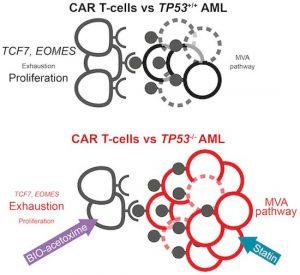CAR T-cell therapy has emerged as a revolutionary approach in treating certain cancers. However, a new study throws a curveball, highlighting a specific mutation in aggressive blood cancer cells that can render this immunotherapy ineffective (Figure 1). This research not only identifies the reason behind the resistance but also proposes solutions to overcome it, offering a glimmer of hope for patients with this challenging form of cancer.
Acute myeloid leukemia (AML) is a highly aggressive form of blood cancer characterized by mutations in multiple genes. One particularly crucial gene is TP53, which acts as a tumour suppressor, helping to prevent uncontrolled cell growth. Unfortunately, mutations in TP53 are often associated with a poor prognosis for AML patients, as these mutations render cancer cells resistant to conventional chemotherapy drugs.
This recent study reveals another layer of complexity. The research team discovered that AML cells harbouring TP53 mutations also exhibit significant resistance to CAR T-cell therapy, a promising new form of immunotherapy. CAR T-cell therapy involves extracting T-cells from a patient’s blood, genetically modifying them in a lab to recognize and attack cancer cells, and then reintroducing them into the patient’s body.
The study sheds light on the mechanism behind this resistance. The researchers discovered that CAR T-cells targeting TP53-mutant AML cells become exhausted more rapidly. This exhaustion renders them less effective in combating the cancer cells.
Despite this roadblock, the research team identified potential solutions to overcome this resistance and make CAR T-cell therapy effective against TP53-mutant AML cells. Their findings suggest two promising avenues:
- Concomitant Pharmacotherapy: Combining CAR T-cell therapy with additional drug treatments could enhance the effectiveness of the therapy against TP53-mutant AML cells.
- Genetically Improved CAR T-Cells: Further advancements in CAR T-cell engineering could involve genetically modifying the CAR T-cells themselves to improve their endurance and effectiveness against TP53-mutant AML cells.
The study demonstrates that by using either additional drug therapies or by genetically enhancing CAR T-cells, researchers were able to significantly improve their effectiveness against TP53-mutant AML cells. These advancements hold promise for achieving treatment outcomes comparable to those seen in AML patients without the TP53 mutation.
This research highlights the ongoing efforts to refine and improve CAR T-cell therapy to overcome resistance mechanisms employed by cancer cells. Further research is needed to validate these findings in clinical trials and pave the way for offering this potentially life-saving treatment to a broader range of patients with aggressive blood cancers like AML.
Journal article: Mueller, J., et al., 2024. Targeting the mevalonate or Wnt pathways to overcome CAR T-cell resistance in TP53-mutant AML cells. EMBO Molecular Medicine.
Summary by Stefan Botha











